Are dogs allergic to kangaroo meat?
Today, we’re embarking on an exciting quest to uncover one of the most perplexing mysteries surrounding our furry pals’ diets. As devoted pet parents, we’re always on the lookout for top-notch nutrition options for our four-legged buddies.
With alternative protein sources gaining popularity, kangaroo meat has emerged as a lean, ethically-sourced, and eco-friendly choice. But here’s the million-dollar query: Can dogs really develop allergies to this exotic meat?
In this riveting article, we’ll dive deep into the captivating world of canine allergies and shed light on whether our loyal companions can indeed experience adverse reactions to kangaroo meat. So grab a steaming cup of joe, kick back, and join us as we separate fact from fiction in this enigmatic realm of doggy allergies to kangaroo meat.
Now, don’t let our casual tone fool you – we’re committed to providing you with accurate and meticulously-researched information on this crucial topic. Let’s dive right in and explore the potential allergy concerns when it comes to feeding your beloved pooches kangaroo meat.
How Common is Kangaroo Meat Allergy in Dogs?
Contents
- 1 How Common is Kangaroo Meat Allergy in Dogs?
- 2 What are the Signs of a Food Allergy in Dogs?
- 3 What Should I Do If My Dog Has an Allergic Reaction to Kangaroo Meat?
- 4 Is it Possible to Test for Kangaroo Meat Allergies in Dogs?
- 5 What Are Some Alternatives to Kangaroo Meat for Dogs with Allergies?
- 6 Can Every Dog Tolerate Kangaroo Meat Without Issues?
- 7 How Can I Monitor My Dog’s Reactions to Different Foods?
- 8 What Are the Benefits of Feeding My Dog Novel Proteins Like Kangaroo Meat?
- 9 Conclusion
Well, you’re in the right place because today we’re diving into the world of kangaroo meat allergies in dogs. While this condition is relatively rare, it’s important to be aware of potential food sensitivities and allergies that could affect your furry companion. So, let’s explore how common kangaroo meat allergy really is in dogs.
Understanding Kangaroo Meat Allergy:
Kangaroo meat allergy in dogs is not frequently encountered, mainly because it is considered a novel protein source for our canine friends. However, just like humans can have allergies to certain foods, dogs can also develop allergies to specific proteins found in meats, including kangaroo meat. These allergies occur when a dog’s immune system recognizes the proteins in kangaroo meat as foreign and launches an allergic response.
Prevalence and Symptoms:
While an exact prevalence rate for kangaroo meat allergy in dogs is not well-documented, it is relatively rare due to limited exposure to this unique protein source. Symptoms of kangaroo meat allergy in dogs are similar to those of other food allergies and may include skin rashes, itching, gastrointestinal upset such as vomiting or diarrhea, and even respiratory issues.
What to Do if Your Dog Shows Allergic Reactions:
If you suspect your dog may be allergic to kangaroo meat or any other food, it is crucial to consult with a veterinarian. They can evaluate your dog’s symptoms and provide appropriate guidance. In some cases, allergy testing may be recommended to identify specific allergens affecting your pup. If a kangaroo meat allergy is confirmed, your vet may suggest switching to alternative protein sources like fish or poultry.
Monitoring Your Dog’s Diet:
While kangaroo meat can be a suitable protein source for dogs with food sensitivities or allergies, it’s important to remember that every dog is unique. Regular monitoring of your dog’s response to different foods can help identify any potential allergies or sensitivities.
If you decide to introduce kangaroo meat into your dog’s diet, pay close attention to any adverse reactions and consult with your vet if necessary.
Conclusion:
In conclusion, kangaroo meat allergy in dogs is relatively uncommon but not unheard of. It’s crucial to be aware of potential food allergies and sensitivities that can affect your furry friend. If you suspect your dog may have an allergic reaction to kangaroo meat or any other food, consult with a veterinarian for proper diagnosis and guidance. With proper monitoring and care, you can ensure your beloved French Bulldog stays healthy and happy.
What are the Signs of a Food Allergy in Dogs?
While it may seem like an exotic possibility, it’s essential to be aware of potential food sensitivities and allergies that could affect your canine companion. In this blog post, we’ll explore the frequency of kangaroo meat allergies in dogs and shed light on this intriguing topic.
The Prevalence of Kangaroo Meat Allergies in Dogs:
Contrary to popular belief, kangaroo meat allergies are relatively rare in dogs. According to a study conducted by veterinary dermatologists, only 0.7% of dogs with food allergies were found to be specifically allergic to kangaroo meat. This indicates that the incidence of kangaroo meat allergies is quite low compared to other common food allergens.
Common Signs and Symptoms of Kangaroo Meat Allergy:
If your French Bulldog is allergic to kangaroo meat, they may display various signs and symptoms, including:
Skin-related issues:
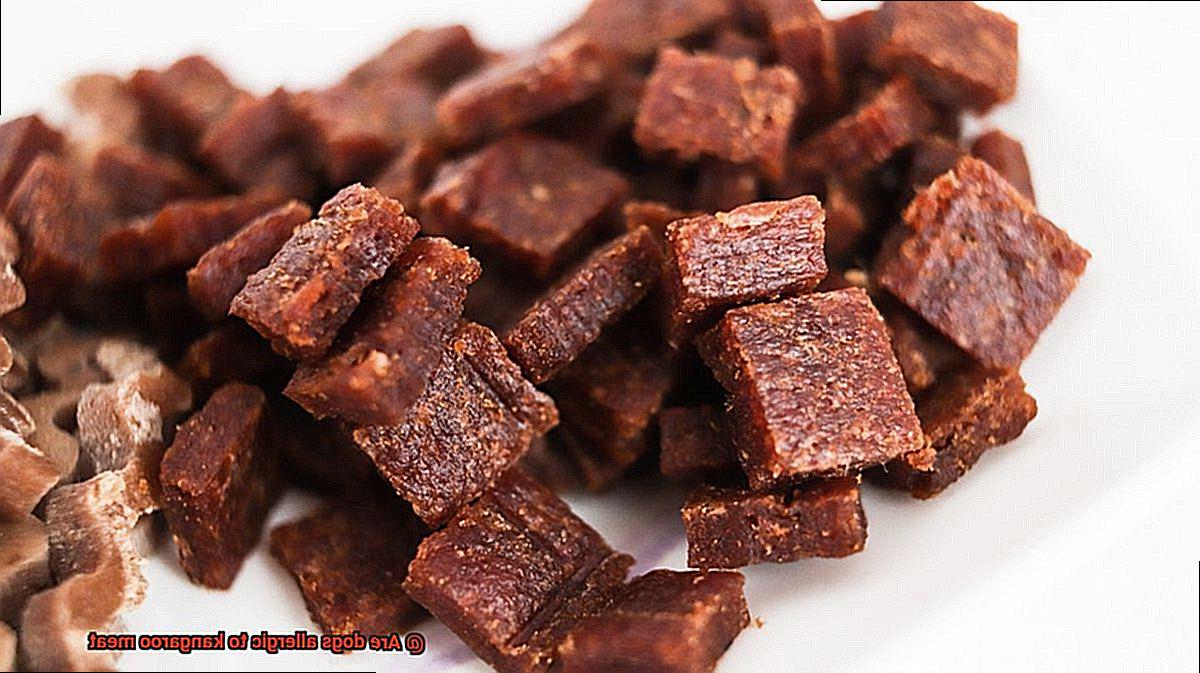
- Itchiness
- Redness and inflammation
- Excessive scratching or licking
- Rashes, hives, or hot spots
Gastrointestinal problems:
- Vomiting
- Diarrhea (possibly with blood)
- Frequent bowel movements
Respiratory symptoms:
- Coughing
- Sneezing
- Wheezing
- Difficulty breathing (in severe cases)
Ear infections:
- Chronic ear inflammation
- Recurrent ear infections
- Itching, redness, and foul odor
- Discharge and head shaking
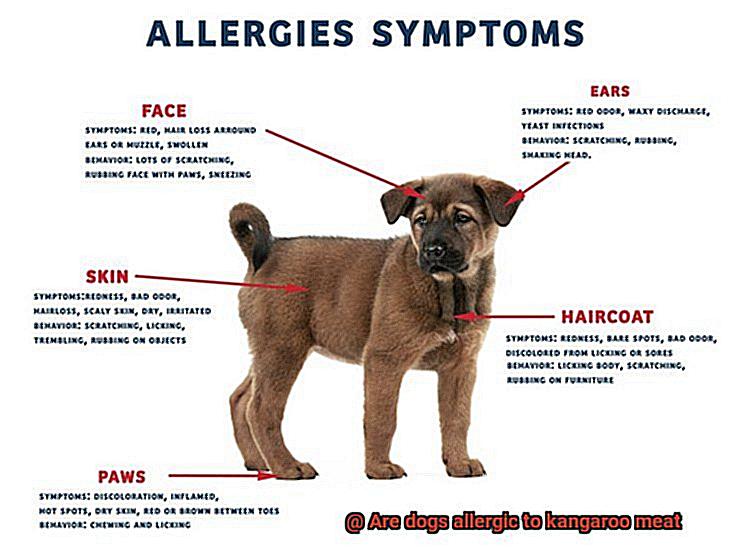

Behavioral changes:
- Irritability
- Restlessness
- Anxiety or aggression
- Changes in appetite or disinterest in food
What Should I Do If My Dog Has an Allergic Reaction to Kangaroo Meat?
French Bulldogs are popular and beloved companions, known for their affectionate nature and adorable wrinkled faces. As a responsible pet owner, it’s essential to be vigilant about your Frenchie’s health and well-being. If you suspect that your four-legged friend is having an allergic reaction to kangaroo meat, here are some steps you can take to help them:
- Remove Kangaroo Meat from their Diet: The first and most crucial step is to eliminate all kangaroo meat from your Frenchie’s diet immediately. This means checking the ingredients of any commercial dog food or treats you give them to ensure they do not contain kangaroo meat. It’s important to read labels carefully as kangaroo meat can sometimes be used as a novel protein source in specialized dog foods.
- Monitor Symptoms: Keep a close eye on your Frenchie for any worsening symptoms. Mild allergic reactions may include itching, redness, hives, or gastrointestinal upset such as vomiting or diarrhea. If your Frenchie’s symptoms are mild and manageable, you may be able to provide supportive care at home.
- Consult Your Veterinarian: It’s crucial to contact your veterinarian as soon as you suspect an allergic reaction. They can provide guidance and recommend appropriate treatment options based on the severity of your Frenchie’s symptoms. Your vet may suggest administering an antihistamine to help alleviate their symptoms, but it’s essential to consult them before giving any medication to your dog.
- Soothe Their Skin: If your Frenchie is experiencing itchiness, you can try bathing them with a hypoallergenic shampoo. Use lukewarm water and avoid scented or harsh shampoos that could further irritate their skin.
- Seek Immediate Veterinary Care for Severe Symptoms: In cases where your Frenchie’s symptoms are severe or if they are having difficulty breathing, it is crucial to seek immediate veterinary care. Severe allergic reactions can be life-threatening and require prompt medical intervention.
- Provide Detailed History to Your Vet: When you visit the veterinarian, be prepared to provide a detailed history of your Frenchie’s symptoms and any dietary changes that may have triggered the allergic reaction. This information will help the vet in diagnosing the allergy and determining the most appropriate course of treatment.
- Follow Your Vet’s Recommendations: Treatment for an allergic reaction may involve medications such as corticosteroids or epinephrine to alleviate symptoms and stabilize your Frenchie’s condition. Your vet may also recommend diagnostic tests, such as blood tests or skin allergy testing, to identify the specific allergen causing the reaction.
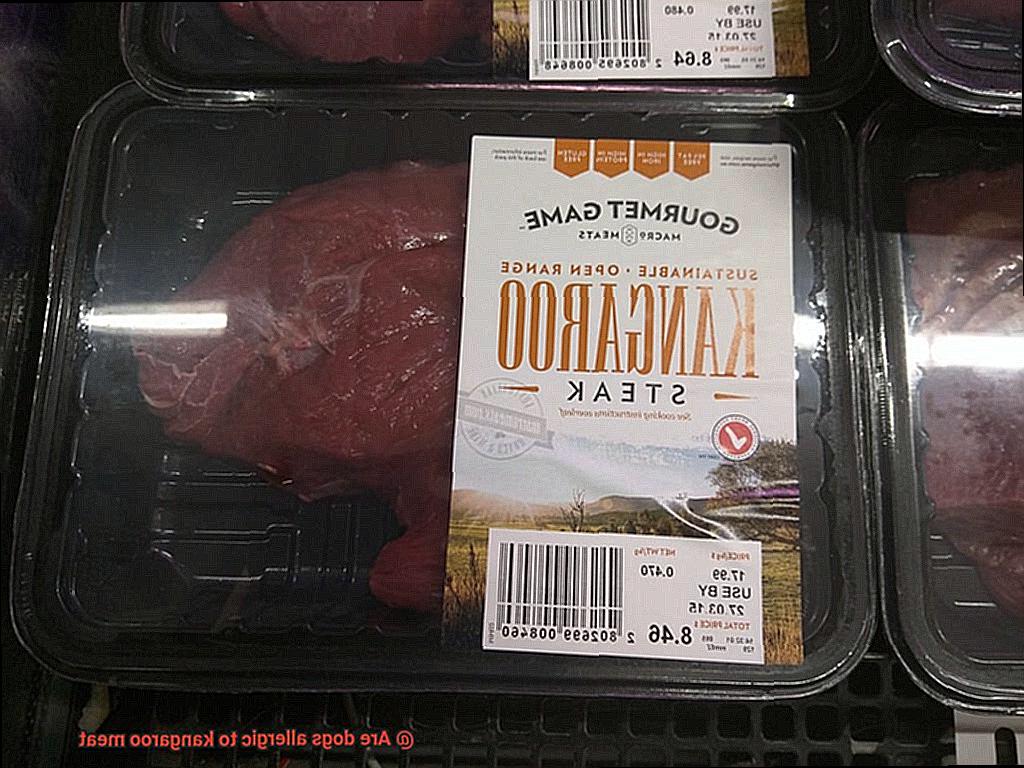
Is it Possible to Test for Kangaroo Meat Allergies in Dogs?
Here’s How to Test
Introduction:
As responsible French Bulldog owners, we want to ensure our furry friends are healthy and happy. If you suspect your Frenchie may be allergic to kangaroo meat, it’s essential to take action and find out for sure. In this article, we’ll explore how you can test for kangaroo meat allergies in dogs and provide helpful tips along the way.
The Elimination Diet:
The first step in testing for a kangaroo meat allergy is an elimination diet. This involves removing all sources of kangaroo meat from your dog’s diet and replacing it with a different protein source for several weeks. Common alternatives include fish, venison, or duck. During this period, closely monitor your Frenchie for any improvements in their symptoms. If their condition improves, it suggests that kangaroo meat could be the culprit.
Reintroduction:
Once the elimination diet has been successful in alleviating symptoms, you can reintroduce kangaroo meat back into your dog’s diet. Observe your Frenchie closely for any recurrence of allergic reactions. If the symptoms return upon reintroduction, it provides further evidence of a kangaroo meat allergy.
Consulting a Veterinary Specialist:
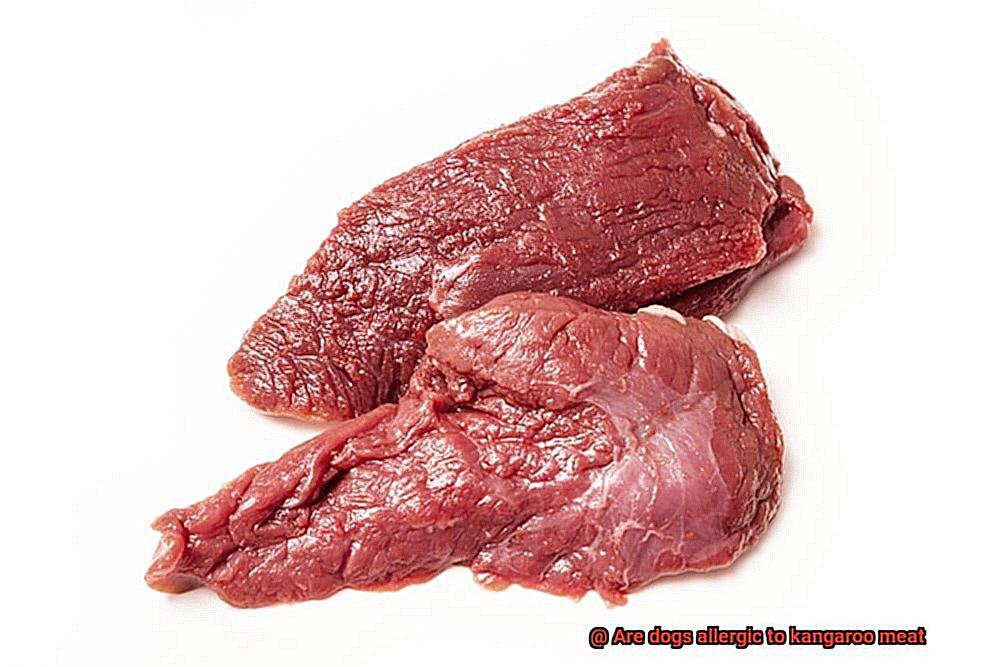
In some cases, the elimination diet and reintroduction process may not provide conclusive results or if the symptoms are severe, further testing may be necessary. It’s recommended to consult with a veterinarian who specializes in allergies. They can guide you on whether specific testing options, such as blood tests or skin prick tests, are available and appropriate for your Frenchie.
Considerations and Nutritional Needs:
It’s important to note that even if testing confirms a kangaroo meat allergy, it doesn’t mean your Frenchie will be allergic to all other proteins. Each dog is unique, and allergies can vary from one individual to another. Therefore, it’s crucial to work with your veterinarian to develop a suitable diet plan that meets your Frenchie’s nutritional needs while avoiding the allergen(s) causing allergic reactions.
What Are Some Alternatives to Kangaroo Meat for Dogs with Allergies?
If your French Bulldog has allergies and you’re searching for alternative protein sources to kangaroo meat, you’re in the right place. While kangaroo meat is often considered hypoallergenic, there are cases where dogs can still develop allergies to it. In this article, we’ll explore some excellent alternatives that can provide the necessary nutrients without triggering allergic reactions.
Novel Proteins:
Introduce novel protein sources into your French Bulldog’s diet. Venison, rabbit, duck, bison, or ostrich are excellent choices. These proteins are less commonly found in commercial dog foods, making them less likely to cause allergies.
Fish:
Fish is a fantastic alternative protein source for dogs with allergies. Opt for salmon, whitefish, or trout, which are rich in omega-3 fatty acids that promote healthy skin and coat. Ensure the fish is thoroughly cooked and free of bones.
Plant-Based Proteins:
Consider a plant-based diet for your French Bulldog. Lentils, peas, or chickpeas offer adequate nutrition while avoiding potential allergens. Work with a veterinarian or veterinary nutritionist to ensure your dog’s nutritional needs are met.
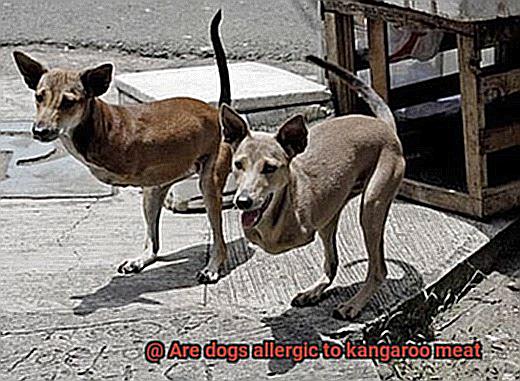
Hydrolyzed Proteins:
Hydrolyzed proteins are broken down into smaller components, reducing the likelihood of triggering an immune response. These proteins are commonly found in specialized hypoallergenic dog foods and are suitable for dogs with severe allergies.
Remember:
- Introduce alternative protein sources gradually under veterinary guidance.
- Allergies can be caused by various factors beyond proteins, such as grains or other ingredients.
- If your French Bulldog continues to experience allergies or intolerances, consider a comprehensive elimination diet or allergy testing.
Can Every Dog Tolerate Kangaroo Meat Without Issues?
Kangaroo meat has gained popularity in recent years due to its lean and nutritious qualities. While it is generally considered safe for dogs, it is important to observe your dog’s individual response when introducing kangaroo meat into their diet.
Why is observing your dog’s individual response important? Let’s dig deeper.
- Allergies can happen: Just like humans, dogs can develop allergies to certain foods, including kangaroo meat. Allergic reactions can manifest as digestive upset, skin rashes, itching, and even respiratory issues. The proteins found in kangaroo meat are different from those found in more commonly consumed meats like beef or chicken. This difference in protein composition may make it less likely for a dog to have an allergy to kangaroo meat if they have previously shown reactions to other meats.
- Gradual introduction is key: It is crucial to introduce any new food gradually and monitor your dog’s reaction closely. Some dogs may have sensitivities or allergies specific to kangaroo meat, even if they have tolerated other proteins well in the past. Start by introducing small amounts of kangaroo meat into their diet and monitor their response. If they show no adverse reactions, gradually increase the amount over time.
- Consult your veterinarian: If your dog shows signs of an allergic reaction after consuming kangaroo meat, it is important to consult with a veterinarian. They can help determine if the reaction is indeed an allergy and guide you on the best course of action.
- Sensitivities vs. allergies: In some cases, a dog may have a sensitivity rather than a full-blown allergy to kangaroo meat. Sensitivities may result in milder symptoms such as mild digestive upset or occasional loose stools.
- Quality matters: The quality and sourcing of kangaroo meat can vary. Opting for high-quality, human-grade kangaroo meat from reputable sources can help minimize the risk of allergic reactions or other issues.

How Can I Monitor My Dog’s Reactions to Different Foods?
We all want our furry friends to enjoy their meals without any tummy troubles or pesky allergies. But how can we monitor their reactions to different foods? As a French Bulldog expert, I’m here to guide you through the process. So grab a croissant and let’s dig in.
Start with a Food Diary:
Just like keeping a journal of your own meals, maintaining a food diary for your French Bulldog can be très important. Write down every ingredient they consume, including treats and snacks. This will help you spot any patterns and identify potential food allergies or intolerances.
Observe Digestive Issues:
Ooh la la. Keep an eye out for any digestive issues your French Bulldog may experience after eating certain foods. Vomiting, diarrhea, excessive gas, or bloating could be signs of a sensitivity or allergy to specific ingredients.
Monitor Skin Conditions:
Allergies can often show up on the skin, mes amis. Watch out for itching, redness, rashes, or hot spots on your French Bulldog’s adorable little body. If they’re scratching or licking certain areas excessively, it could be an allergic reaction to a particular food.
Note Changes in Behavior:
Vive la différence. Pay attention to any changes in your French Bulldog’s behavior after mealtime. If they become hyperactive, lethargic, agitated, or exhibit unusual mood swings, it might be a sign of an adverse reaction.
Consider Weight Gain or Loss:
Keeping track of your French Bulldog’s weight is crucial when introducing new foods. Sudden weight gain or loss without any other apparent cause might indicate an intolerance or allergy to specific ingredients.
Consult with Your Veterinarian:
When in doubt, seek professional advice from your veterinarian. They can perform tests and recommend an elimination diet to identify the specific allergens affecting your French Bulldog. C’est magnifique.
Conduct Elimination Trials:
Time for some detective work. An elimination diet involves removing potential allergens from your French Bulldog’s diet for a specific period and then reintroducing them one by one. This will help you identify the specific foods that cause allergies or sensitivities.
Consider Allergy Testing:
If the elimination trials don’t provide clear answers, your veterinarian may suggest allergy testing. Blood tests or intradermal skin testing can pinpoint the specific allergens affecting your French Bulldog, allowing for targeted treatment.
Seek Professional Guidance:
For paw-some guidance tailored to your French Bulldog’s unique dietary needs, consider working with a veterinary nutritionist or certified canine nutritionist. They can help you develop a balanced and appropriate diet plan, ensuring your Frenchie stays healthy and happy.
What Are the Benefits of Feeding My Dog Novel Proteins Like Kangaroo Meat?
Well, look no further. In today’s post, we’re going to explore the pawsitive benefits of feeding your French Bulldog novel proteins like kangaroo meat. This unique protein source can be a game-changer for dogs with allergies, improve digestion, provide essential nutrients, and add a little excitement to mealtime. So, grab a baguette and let’s get started.
Allergy Relief: Say au revoir to food allergies.
If your Frenchie suffers from food allergies or sensitivities, kangaroo meat can come to the rescue. Unlike common proteins found in commercial dog foods like beef or chicken, kangaroo meat is considered hypoallergenic. Its unique amino acid profile makes it less likely to trigger allergic reactions and keeps those sneezy episodes at bay.
Happy Tummy, Happy Frenchie:
Is your Frenchie prone to tummy troubles? Switching to kangaroo meat can help improve digestion and nutrient absorption. Dogs that have been on the same diet for a long time may develop sensitivities to certain ingredients. Introducing a novel protein like kangaroo can give their bellies a break and promote better gut health. Plus, kangaroo meat is leaner and lower in fat, making it paw-fect for weight management.
Nutrient Powerhouse:
Kangaroo meat isn’t just delicious; it’s packed with essential nutrients too. High in protein, it helps build strong muscles, supports immune function, and repairs tissues. The omega-3 fatty acids found in kangaroo meat promote healthy skin and coat while reducing inflammation. And let’s not forget about the vitamins and minerals like iron, zinc, and B vitamins that contribute to overall health and vitality.
Variety is the Spice of Life:
Just like humans, our furry friends can grow tired of the same old food every day. Introducing kangaroo meat as part of a rotational diet adds excitement and prevents picky eating habits. Your Frenchie will be wagging their tail in delight with each meal.
NRulUx6GILE” >
Conclusion
In conclusion, it is important to consider the potential for dogs to develop allergies to kangaroo meat.
While some dogs may be able to tolerate this exotic protein source without any adverse reactions, others may experience allergic symptoms such as itching, skin rashes, digestive issues, or even more severe reactions like difficulty breathing. Therefore, if you are considering introducing kangaroo meat into your dog’s diet, it is crucial to monitor their response closely and consult with a veterinarian if any concerning symptoms arise.
Remember, every dog is unique and what works for one may not work for another.




